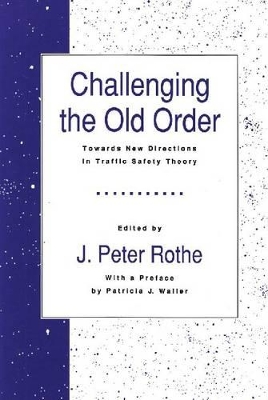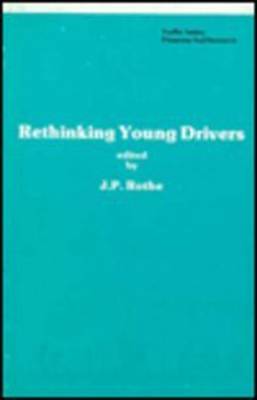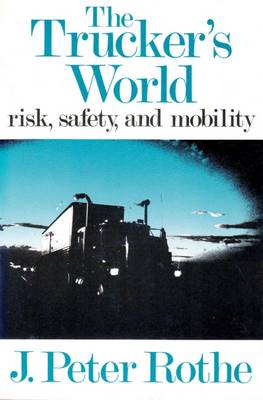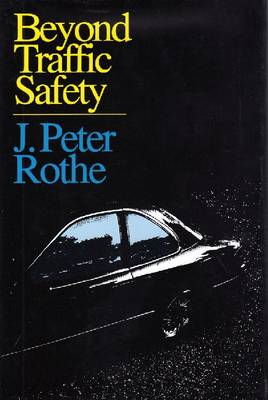Traffic Safety
4 total works
Traditionally, efforts to promote traffic safety have been limited to the sphere of driver, vehicle, and roadway. Only recently has research begun to look at the larger society. Despite this, most areas of traffic policy remain telescopic. This volume begins to remedy that deficit. Too often, traffic safety personnel base their actions on piecemeal data, isolated philosophical direction, and limited conceptualization. Decisions are reached quickly, but without rigorous reflection, and with no comprehensive policy orientation. Rothe and his group have led an innovative effort to develop new orientations in traditional disciplines (such as law, psychology, education, engineering) as well as to identify disciplines that should be contributing to the field (such as qualitative sociology economics, political science, communication, and ethics). Their purpose is to take traffic safety research to a higher plane. This book is the result of a week-long discourse in which internationally renowned scholars presented informed points of view that have not previously been topical in traffic-related research. Their arguments were debated and critiqued by practitioners, researchers, political officials, and other members of the traffic safety community. The result of this unusual approach is a state-of-the-art volume of fundamental importance to policymakers concerned with traffic safety issues.
This is a book about truck driver's lives, risks, and views on safety. As a group, truckers represent a significant population of road users whose high-exposure driving creates a major challenge for safety. Research into the larger social, political, and economic forces that affect trucker's safety problems has been scarce. The Trucker's World comes to terms with the socioeconomic environment that contributes to breakdown in trucker safety and chronicles the lives and times of truckers as they try to make ends meet. It analyzes driver risk by exploring the reasons, reactions, and consequences of risk.The author approaches his task with a research question: Why is the average trucker continuously placed in conditions that, according to truckers, demand risky driving? As a result of direct experience with truckers and trucking, Rothe observes that truck drivers act as they do to gain autonomy over their work, freedom from control of others, and assurance of a reasonable livelihood. In order to maintain a sufficient income in the transportation market, even the most serious drivers perform tasks that often impinge on lethality and safety, not as blatant radicals or daredevils fighting the system, but as persons responding to the fear that they may lose their livelihood in trucking.The thrust in trucker safety has followed a victimization philosophy in which emphasis on interventions has been aimed directly at truckers. Rothe contends that safety programs would work better if they emphasized what influences, motivates, or encourages truckers to take chances on the road. With this in mind, he analyzes driver risk, vehicle maintenance, owner-operator, company driver, policing, home life, drugs and alcohol, government regulations, and hours of service as they are seen by truckers, industry officials, and others. Expanding our vision to encompass essential factors in the socioeconomic reality of the truck-driving culture. Rothe elucidates the far-reaching consequences that safety issues have for truckers, other road users, policymakers, and traffic safety educators.
Peter Rothe's absorbing volume examines one of the most important areas of modern life, the culture of the automobile. Rothe takes a problem central to everyday life - auto safety - and reconstructs it into a means of revealing the human condition. His goal is to motivate the reader to think differently about traffic safety, and to suspend all inherited epidemiological, engineering, and psychological beliefs. Because traffic arises from the interaction between people, he argues that traffic safety is a social process, one that is created, formed, and changed by human interaction.Beyond Traffic Safety presents controversial critiques and provocative positions. It stimulates insight into the question of why traffic safety issues have become so important today. Rothe explores new social boundaries and crosses old ones. He demonstrates that interlinking social factors in a motorist's behavior reveal traffic safety as a significant facet of social behavior worthy of in-depth exploration. This may well be the first work of fundamen-tal theory in an area thus far dominated by crude empiricism.Beyond Traffic Safety describes responsibilities of drivers and examines how basic trust in traffic routines sustains an orderly traffic flow. It shows how physical risks are negotiated to accommodate social expectations. Part of the text is devoted to the role played by the driver's license as a form of social control, emphasizing the way in which various images of licensing convey different ideas about traffic safety. Rothe focuses on the development of traffic laws and how laws affect driver behavior. He also traces the roles that discretion and tolerance play in police work. In particular, the dominant traffic violation, speeding, is analyzed.Rothe looks at traffic safety in a new way by presenting it as part of a social scientific framework. He provides a basis for future exploration of this kind. Beyond Traffic Safety is an important and insightful analysis for road users, traffic safety educators, policymakers, psychologists, and sociologists.



